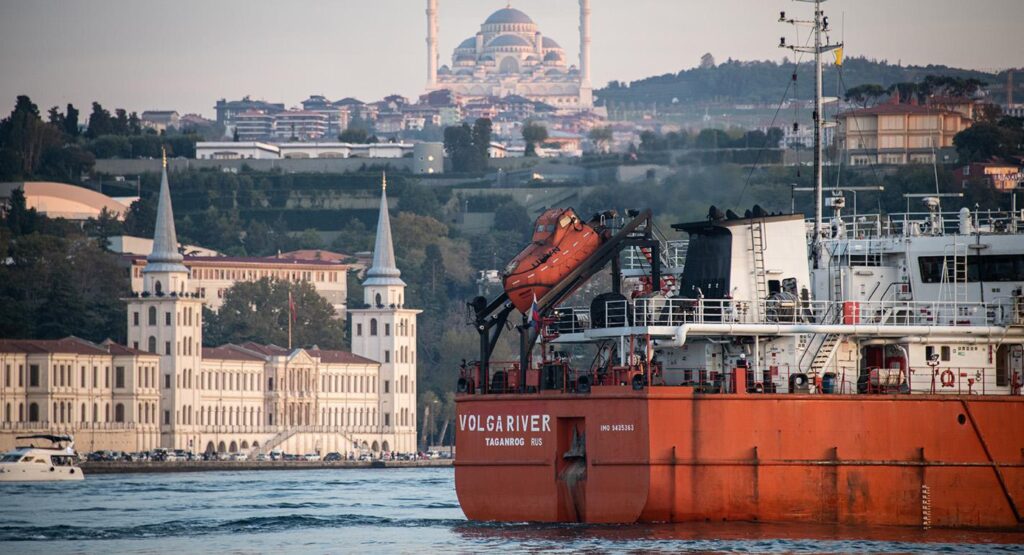Regarding the ongoing war in Ukraine, is Turkey on Russia’s side or on the West’s side? The answer depends on your perspective.
Meanwhile, Turkey is providing military and diplomatic support to Kiev, and President Recep Tayyip Erdogan has vowed to never accept a Russian seizure of Ukrainian territory, the same stance he took when Moscow annexed Crimea in 2014. Turkey has played a key role in securing Ukraine’s maritime exports, first through UN-brokered grain deals and now thanks to a corridor within its territorial waters.
Turkey, meanwhile, has not joined Western sanctions against Russia. It is the largest buyer of Russian oil after China and India. Istanbul airport remains an air hub connecting Russia’s major cities while most of Europe has cut off air links to Russia. Erdogan is preparing to host Putin on February 12, despite the Russian president being a pariah in the West.
Turkey’s rebalancing has gone through various stages, sometimes leaning closer to the West, sometimes closer to Moscow, and more recently, leaning more towards the United States and its allies.
At the end of January, the Turkish parliament finally approved Sweden’s entry into NATO (new membership requires unanimous approval by existing member states). The issue of Swedish membership became a bargaining chip, with Ankara demanding concessions from both Stockholm and, more importantly, the US government and Congress.
Erdogan appears to have gotten his wish. Prior to the congressional vote, the US State Department approved a $23 billion deal to sell Turkey 40 new F-16 fighter jets. The US Congress, which has given no support to Erdogan from either Democrat or Republican sides, is expected to approve the transfer.
Delivery of the F-16s will take years to complete due to a backlog at U.S. defense contractor Lockheed Martin, but the contract marks a political turning point: Turkey needs the fighter jets to make up for its expulsion from an international consortium building F-35 fighter jets, a punishment for Ankara’s procurement of Russian-made S-400 surface-to-air missiles in 2019.
Tensions arising from the military agreement with Moscow escalated to the point where the US government imposed sanctions on Turkey’s defense procurement agency under the Counterterrorism and Sanctions Act (CAATSA). But over the past 12 months, Ankara and Washington appear to have repaired some of their differences and begun negotiating again on a range of issues, from NATO expansion to Middle East diplomacy in response to the Gaza war.
Moreover, Turkey appears intent on complying with US secondary sanctions against Russia. Following President Joe Biden’s December executive order punishing foreign companies that support Moscow’s war efforts, Turkish banks have reportedly cut off business with Russian banks. According to Russia’s Kommersant newspaper, exceptions are only allowed for subsidiaries of foreign banks in Russia.
At the same time, Turkey is increasing its presence in the Black Sea. On January 11, Turkish Defense Minister Yaşar Güler launched a joint naval operation with Romania and Bulgaria. As part of the operation, the three countries will send mine-clearing vessels, patrol boats, helicopters and drones to remove stray mines from sea routes that have been a problem since the start of hostilities in Ukraine.
While the Black Sea Mine Countermeasures Group is in theory open to other NATO allies, Turkey is strict in enforcing international rules that ban warships from countries other than the Black Sea coastal states from passing through the Bosphorus in wartime.
All these developments are important, but they represent a tactical readjustment rather than a strategic overhaul of Turkish foreign policy. President Erdogan and the Turkish elite have no intention of abandoning Russia.
Energy trade remains the backbone of Moscow-Turkey relations. Turkish imports of Russian oil hit a record 400,000 barrels per day in November, about 14% of Russia’s seaborne crude, according to Reuters calculations. Imports could rise further in 2024 after Russia’s Lukoil signed a 200,000 barrels per day crude supply deal with Turkey’s Star refinery and provided a $1.5 billion loan.
Some of the oil currently pumped to Lukoil’s Neftokhim refinery in Bulgaria (exempt from EU sanctions) will likely be redirected to STAR, located next to the Aegean port city of Izmir. Its refining capacity would likely mean Turkey strengthens its role as a hub for Russian oil exports, including to the EU. In addition, Turkey re-exports petroleum products from Russia (imports of Russian diesel and other fuels will triple in 2023).
But it’s not just oil. Turkey is also becoming increasingly important for Russian natural gas transit. With a transit agreement between Gazprom and Ukraine expiring at the end of this year, the TurkStream pipeline is likely to become Russia’s only export route to the EU. Turkish state utility BOTAS has already signed contracts to supply Hungary’s MVM and Moldova’s Moldovagas. It also has access to Bulgaria’s electricity grid, including the little-used Trans-Balkan pipeline, which was the main route for bringing Russian natural gas to Turkey before the completion of the undersea pipeline TurkStream.
In other words, Turkey could buy Russian gas from Gazprom, mix it with gas from other sources, and resell it to European countries looking to diversify their energy supplies.Russian President Vladimir Putin said in 2023 that a deal for a Turkish “gas hub” was in the works.But even without a formal agreement with Moscow, Turkey seems well-positioned to benefit from Russia’s isolation from the European gas market, which absorbed the majority of Gazprom’s shipments before its full-scale invasion of Ukraine.
The huge profits from energy deals ensure that Turkey’s partial tilt toward the West will not have a major impact on its relations with Russia. Moscow needs Erdogan more than ever because of the economic lifeline he provides. Similarly, Washington would prefer to build a relationship with Turkey rather than antagonize it. Both the United States and Russia have learned to tolerate Turkey’s tightrope walking.


